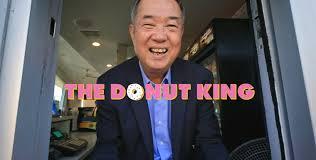
Ted Ngoy came to America, a refugee from Cambodia’s genocide, with nothing but some family members — and great drive. Worked hard at various jobs, one in a donut shop, where he learned the business. Then he started his own. Leading the way for fellow Cambodian refugees to make the donut trade their specialty. Eventually Ted built an empire of around 65 stores, and bought a gorgeous California mansion, which he loved.
The story is told in a fascinating 2020 film, The Donut King, aired on PBS.

I was struck by what a positive, welcoming attitude America had then, in the 1970s, toward refugees and immigrants. True to our fundamental ideals. And their rightness was exemplified by the story of Ted and his fellow Cambodian refugees, contributing greatly to this country. Latterly, of course, we’ve lost our way on this, succumbing to a nasty xenophobic irrationalism, poisoning American minds. I’d hoped President Biden would undo Trump’s damage (he promised me), and he’s done some, but not nearly enough. Even some wall construction continues.
Ted’s story included a fairy tale romance. Back in Cambodia, he was a young nobody, smitten by a girl from an elite family. By pluck and grit he won her.
But as the whole beautiful story unfolded in the film, I remembered being told at the outset that Ted would lose everything. I kept wondering how.

Then he discovers Las Vegas.
We visited there when our daughter was little. Walking through a casino, I suggested she think about the cost of building that sumptuous edifice. The electricity cost for all the dazzling lights. And wages for all the employees. Et cetera. Where does all that money come from — with the owners making profits besides? From the pockets, obviously, of people gambling there. Most have to be losers.
B.F. Skinner posited that gamblers keep at it because they’re conditioned by the periodic psychic rewards of wins. Such reward/punishment conditioning was Skinner’s theory of everything. He was wrong. Wins are not gambling’s rewards. (Anyhow they’d be outweighed by more frequent losses; and human psychology hates losses more than it loves gains.) Gambling’s reward is instead the spritz of adrenaline thrill with every roll of the dice and turn of a card. A fix to which some gamblers become addicted.

Ted did. That’s how he lost everything. Blowing his whole donut fortune and mortgaging his stores to the point of bankruptcy. He lost his cherished mansion. And his fairy tale marriage, with his wife powerless to stop his self-destruction. The last straw was his having “a little affair,” as he put it with a sheepish grin.
Indeed, the film showed him to be still a cheerful upbeat fellow, despite his catastrophe.
One can understand addiction to the rush each time one bets. How that could have kept Ted coming back again and again. But squandering his entire wealth? Not even holding back a fraction? Didn’t he grasp that by blowing everything, he destroyed his capability to continue gambling? The one one thing he came to crave above all else.
The human story was what was really so compelling in this film. Ted’s donut empire was a monument to rationality. His heedless self-destruction a monument to irrationality.
Human beings: you gotta love them.
